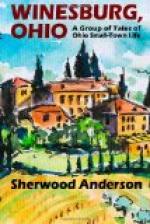At eleven o’clock Tom got back into town. George Willard found him wandering about and took him into the Eagle printshop. Then he became afraid that the drunken boy would make a mess on the floor and helped him into the alleyway.
The reporter was confused by Tom Foster. The drunken boy talked of Helen White and said he had been with her on the shore of a sea and had made love to her. George had seen Helen White walking in the street with her father during the evening and decided that Tom was out of his head. A sentiment concerning Helen White that lurked in his own heart flamed up and he became angry. “Now you quit that,” he said. “I won’t let Helen White’s name be dragged into this. I won’t let that happen.” He began shaking Tom’s shoulder, trying to make him understand. “You quit it,” he said again.
For three hours the two young men, thus strangely thrown together, stayed in the printshop. When he had a little recovered George took Tom for a walk. They went into the country and sat on a log near the edge of a wood. Something in the still night drew them together and when the drunken boy’s head began to clear they talked.
“It was good to be drunk,” Tom Foster said. “It taught me something. I won’t have to do it again. I will think more dearly after this. You see how it is.”
George Willard did not see, but his anger concerning Helen White passed and he felt drawn toward the pale, shaken boy as he had never before been drawn toward anyone. With motherly solicitude, he insisted that Tom get to his feet and walk about. Again they went back to the printshop and sat in silence in the darkness.
The reporter could not get the purpose of Tom Foster’s action straightened out in his mind. When Tom spoke again of Helen White he again grew angry and began to scold. “You quit that,” he said sharply. “You haven’t been with her. What makes you say you have? What makes you keep saying such things? Now you quit it, do you hear?”
Tom was hurt. He couldn’t quarrel with George Willard because he was incapable of quarreling, so he got up to go away. When George Willard was insistent he put out his hand, laying it on the older boy’s arm, and tried to explain.
“Well,” he said softly, “I don’t know how it was. I was happy. You see how that was. Helen White made me happy and the night did too. I wanted to suffer, to be hurt somehow. I thought that was what I should do. I wanted to suffer, you see, because everyone suffers and does wrong. I thought of a lot of things to do, but they wouldn’t work. They all hurt someone else.”
Tom Foster’s voice arose, and for once in his life he became almost excited. “It was like making love, that’s what I mean,” he explained. “Don’t you see how it is? It hurt me to do what I did and made everything strange. That’s why I did it. I’m glad, too. It taught me something, that’s it, that’s what I wanted. Don’t you understand? I wanted to learn things, you see. That’s why I did it.”




